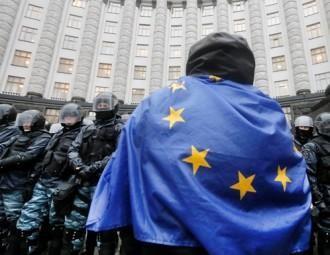Andrei Kazakevich: Battle of Ukraine is fundamental for Russia
 photo by korrespondent.net
photo by korrespondent.net
If Ukraine manages to turn to Europe, it will give rise for Eurointegration in the whole region.
Andrei Kazakevich, the director of the Institute for Policy Studies Palіtychnaya Sphera (Political Sphere), comments on the situation in Ukraine, and possible consequences of Eurorevolution for the region in the talk with the EuroBelarus Information Service.
- Summit in Vilnius ended in Ukraine’s Eurorevolution, which can transform the geopolitical landscape of the continent. How do you assess the chances of the revolution in Ukraine?
- It seems to me that serious results won’t be achieved right away. We are very likely to see considerable mobilization of opposition, which now has a specific opponent. Of course, future elections in Ukraine will be exploited to win power.
- Can we say that Yanukovich refusal to sign the Association Agreement with the EU has become a trigger for the events that are unfolding in Ukraine now?
- Yes, this is true. Although certain pressure was felt in the Ukrainian society before, at least over the last year opposition lacked some common idea, or a specific opponent, which, thanks to Yanukovich, the opposition finally has now.
- Ukrainian President has already called European Commission President Jose Manuel Barroso, which can be interpreted as an attempt to gain time as well as an attempt to retreat. What is your interpretation?
- There is no doubt that Yanukovich made a mistake being rude with the EU, and the call to Barroso was meant to amend the situation which is getting out of hand now.
But this call can’t reverse the situation inside the country. The refusal to sign the Association Agreement was the reason for the society’s mobilization, but not the prime cause. The confrontation is developing into inner political crisis, not the crisis of European integration. And neither calls nor sensible reasoning can positively affect the inner political situation.
- Can the situation be reversed to the point of Vilnius Summit, or it is impossible by now?
- Nothing is impossible; but we need time for that – months, if not years. Ukrainian authorities breached the established rules, i.e. long negotiations and preparation process. So the return to the situation on the eve of the Summit won’t happen fast anyway.
We should also remember that the refusal to sign the Agreement was caused by Russia’s political game, and Ukraine shouldn’t disregard that when trying to win the situation back.
- How far can Russia go to keep Ukraine on a short leash?
- This question is connected with personal issues, too. The project of Eurasian integration, voiced by Putin in due time, becomes pointless without Ukraine, which supplies EurAsEC with people and economic potential. That is why battle of Ukraine is fundamental for Russia, though I don’t think that Russian authorities are going to risk its own economic and financial stability.
I would assess the ending of the Summit as considerable tactical foreign-policy victory of Russia. Several months ago most experts believed that Ukraine would sign the Association Agreement; and the fact that Russia managed to turn the situation to its own advantage can be considered quite an accomplishment.
- How can Ukrainian revolution influence the future of the Eastern Partnership?
- It will, indeed. If revolution will cause the change of power, the return to the starting point will happen automatically. If pro-Western, pro-European forces come to power, it will activate Eurointegration process and completely change the situation within the EaP, too, where Ukraine plays the key role. If Ukraine turns to Europe, the whole region will switch to the EU. And that can completely change the situation within the EaP program; the processes might go faster for most countries-members.
If Ukrainian revolution doesn’t result in change of power, and Yanukovich strengthens his stance with Russia’s support, it might lead to the reverse reaction of Belarus, Armenia and Azerbaijan. Eastern Partnership might stop its work and become a fiction: from six countries-members only two – Georgia and Moldova – will stay. And vice versa: if Ukrainian revolution manages to change the power in the country, it might turn the whole region to the European integration.
- It means that Ukrainian events cannot but affect Belarus…
- Right, though we can’t give specific forecast what kind of influence it will be.
A new strong actor will appear in the triangle Belarus-Russia-Kazakhstan if Ukraine joins the Customs Union. Many processes within the EaP will become more dynamic. If Ukraine falls out of the Customs Union and turns to Eurointegration, all Eurasian initiatives turn into a small periphery with loyalty to Russia, and that will have grave consequences for Belarus.
-
03.01
-
07.10
-
22.09
-
17.08
-
12.08
-
30.09








































